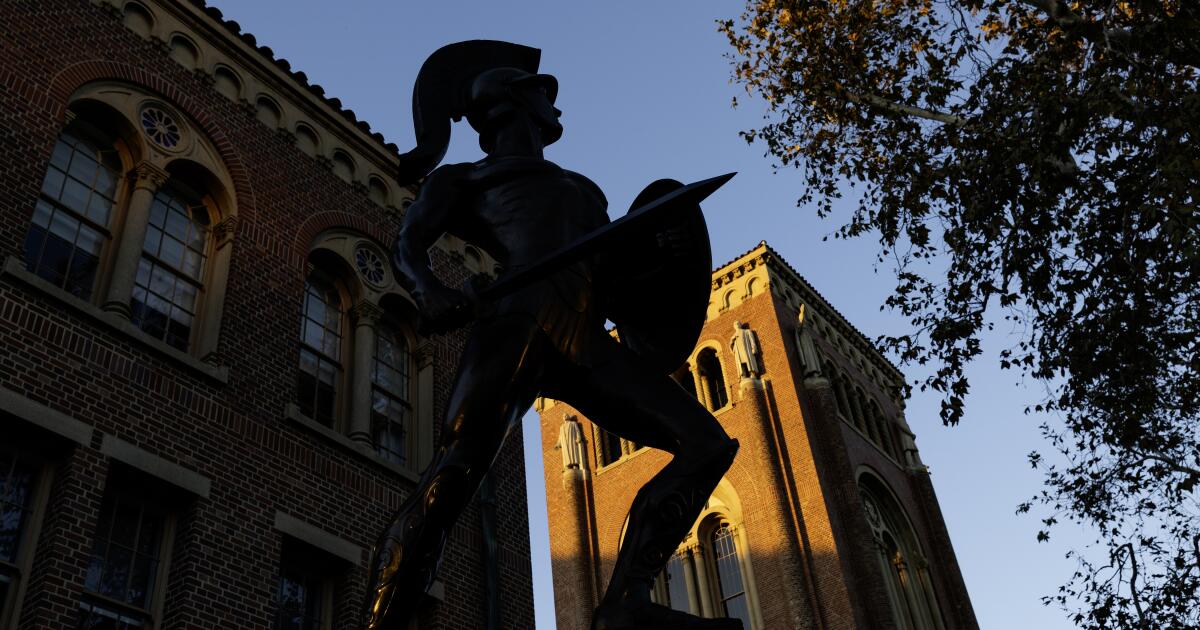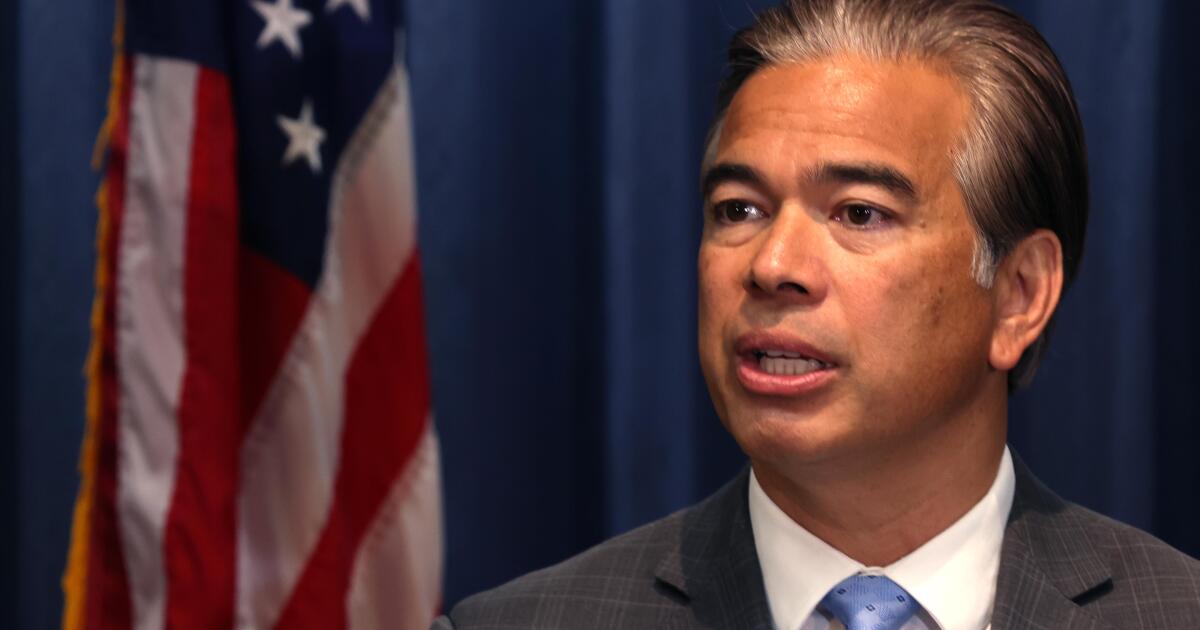
As USC weighs its options, MIT has become the first of nine universities to forcefully reject a White House proposal that asks them to adopt President Trump’s conservative political agenda in exchange for favorable access to federal funding.
In a letter to Trump administration officials, MIT President Sally Kornbluth said Friday the campus disagrees with provisions of the proposal, including some that would limit free speech and the university’s independence. She said that Trump’s “Compact for Academic Excellence in Higher Education” is inconsistent with MIT’s belief that scientific funding should be based on merit alone.
“Therefore, with respect, we cannot support the proposed approach to addressing the issues facing higher education,” Kornbluth said in a letter to Education Secretary Linda McMahon and White House officials.
The MIT rejection comes as University of Southern California has been roiled by the proposed compact since receiving it earlier this month. The school’s faculty members strongly denounced the offering at a meeting this week, calling it “egregiously invalid,” “probably unconstitutional” and “antithetical to principles of academic freedom.”
But interim President Beong-Soo Kim told the roughly 500 attendees the university “has not made any kind of final decision.”
At the same time, Gov. Gavin Newsom has aggressively weighed in, challenging USC “to do the right thing” and reject the offer. He threatened to withhold state funding to any California university that agrees to it.
White House spokesperson Liz Huston said that “the Trump Administration’s only request is for universities to end discrimination. Any university that refuses this once-in-a-lifetime opportunity to transform higher education isn’t serving its students or their parents — they’re bowing to radical, left-wing bureaucrats.”
“The truth is, the best science can’t thrive in institutions that have abandoned merit, free inquiry, and the pursuit of truth,” Huston said. “President Trump encourages universities to join us in restoring academic excellence and commonsense policies.”
What’s in the compact
The higher-education compact circulated this month requires universities to make a wide range of commitments in line with Trump’s political agenda. In exchange, universities that agree to the terms would get more favorable access to federal research grants and additional funding, as well as other benefits.
They would have to accept the government’s definition of gender — two sexes, male and female — and would not be allowed to recognize transgender people’s gender identities. Foreign student enrollment would be restricted. The compact also calls for a five-year tuition freeze for U.S. students.
It asks colleges to require the SAT or ACT for all undergraduate applicants and to eliminate race, sex and other characteristics from admissions decisions. As for free speech, schools would have to commit to promoting a wide range of views on campus — and change or abolish “institutional units that purposefully punish, belittle, and even spark violence against conservative ideas,” according to the compact.
The universities were invited to provide “limited, targeted feedback” by Oct. 20 and make a decision no later than Nov. 21.
Other institutions that received the 10-page proposal are: Vanderbilt, the University of Pennsylvania, Dartmouth College, the University of Arizona, Brown University, the University of Texas and the University of Virginia. It was not clear how the schools were selected or why.
Leaders of the Texas system were “honored” that the Austin campus was chosen to be a part of the compact and its “potential funding advantages,” according to a statement from Kevin Eltife, chair of the board of regents.
University leaders face immense pressure to reject the compact amid opposition from students, faculty, free speech advocates and higher education groups. Leaders of some other universities have called it extortion. The mayor and City Council in Tucson, home of the University of Arizona, formally opposed the compact, calling it an “unacceptable act of federal interference.”
Some conservatives have criticized it. Frederick Hess, director of education policy at the American Enterprise Institute, called it “profoundly problematic” and said the government’s requests are “ungrounded in law.”
“I am deeply sympathetic to the Trump critique of higher education,” he told The Times on Friday. “I support just about every point in the compact, but even I have real concerns about the way it has been framed and proffered.”
But Hess noted that the compact has become something of a “Rorschach test.”
“If you look at it one way, you see a bullying attempt by the administration to impose its will,” he said. “If you look at it another way, it is the Trump administration offering a positive, constructive vision of the federal-university partnership.”
The view from Los Angeles
The USC faculty’s vociferous disapproval of the compact during a meeting of the university’s academic senate on Oct. 6 was in line with the reactions of similar bodies at other affected campuses.
In stark terms, USC department heads, professors and others condemned the compact, with several saying there should be no negotiations with the Trump administration.
Kim, the interim president, attended the meeting, but did not share his opinion of the compact. He noted that USC did not solicit the offer from Trump. “I wanted to make sure that I heard from the community and received your input,” he said.
Asked for comment Friday, a USC spokesperson referred The Times to comments Kim made Oct. 3, when he said that he would consult with the school’s board of trustees and other stakeholders to “hear their wide-ranging perspectives” on the proposal.
Trump’s proposal comes at a fraught time for USC, which is in the midst of widespread layoffs as it faces down a $200-million budget deficit.
Across town, UCLA has also been grappling with dire financial issues of its own, albeit ones that directly relate to the president’s forceful attempt to remake higher education.
UCLA has been negotiating with the Trump administration over a $1.2-billion settlement proposal that would resolve a federal investigation into alleged civil rights violations on campus. The claims stem from UCLA’s handling of alleged antisemitism during spring 2024 pro-Palestinian protests. UC leaders say the fine would be “devastating” to the 10-campus system and have broadly indicated that other proposals violate the university’s mission and values.
Speaking at a UC-wide academic senate meeting Thursday, UC President James B. Milliken said the “landscape changed” after the Trump administration offered the compact last week to non-UC campuses.
He did not indicate whether the proposal affected UC negotiations but said that there was a “shift from a bespoke pursuit of universities to a wholesale” targeting of higher education, which he suggested put UC in a safer position. He said he did not know the impact of the compact on UCLA.
In some ways, the compact presented to USC matches the settlement proposed to UCLA. Both, for example, make stipulations about binary definitions of gender that exclude transgender people.
But the compact differs in proposing strict limits on foreign student enrollment and the tuition freeze for U.S. citizens.
Although the compact has not been offered to UC, university officials are studying its contents to better understand Trump’s positions on higher education and formulate a negotiation strategy.
Colleges nationwide debate compact
Besides USC and MIT, the compact has been the subject of fierce debate at several other campuses that received it.
At an Oct. 3 convening of the University of Virginia senate attended by interim President Paul G. Mahoney and hundreds of faculty, senate representatives voted down the compact.
According to notes on the meeting provided to The Times, faculty expressed concern over academic freedom, discrimination against transgender individuals — and said they feared complying with it would have a “chilling” effect on free speech.
Three days later, at a meeting of the University of Arizona faculty senate, 81% of voting members rejected the government’s proposal.
At Dartmouth, President Sian Leah Beilock has also expressed hesitation over signing.
“I am deeply committed to Dartmouth’s academic mission and values and will always defend our fierce independence,” Beilock said in a statement. “You have often heard me say that higher education is not perfect and that we can do better. At the same time, we will never compromise our academic freedom and our ability to govern ourselves.”
Some university faculty, including at USC, have voiced skepticism over Trump’s willingness to adhere to the terms of the compact should an institution accept it. That, Hess said, is “a valid concern.”
“If you look at the deal that have been struck [by the Trump administration] around tariffs and tech, there is certainly a sense that deals … are not written in stone,” he said. “Normally, in these conversations, I am usually very skeptical of faculty concerns, but from what we’ve seen … a lot of these practical concerns are very legitimate.”
Binkley writes for the Associated Press.



